Phony Overtime, Fictional Drug Buys, and Mysterious C.I. Payments Offer a Glimpse of Houston Police Corruption
The charges against six narcotics officers reveal a culture of shady practices that led to a deadly drug raid.

On January 22, 2019, Houston narcotics officer Hodgie Armstrong paid a confidential informant who bought drugs as part of a case he was investigating. The informant made the purchase around 6 p.m. that day at 4437 Knoxville Street, and another narcotics officer, Steven Bryant, was there to observe the transaction and Armstrong's payment to the informant an hour and a half later, serving as the witness required by Houston Police Department policy.
Or so Armstrong and Bryant claimed. According to the local prosecutors who this week accused Armstrong of tampering with a government record, cellphone location data showed Bryant was nowhere near that address at the time of the purported drug purchase or the subsequent payment. At 6 p.m., the charge against Armstrong says, Bryant was more than 30 miles from 4437 Knoxville Street; between 7:30 and 8 p.m., he was more than 25 miles away.
That incident illustrates the widespread irregularities in the HPD's Narcotics Division that have been discovered following the January 2019 drug raid that killed a middle-aged couple, Dennis Tuttle and Rhogena Nicholas, in their home on Harding Street. The Harding Street raid, which discovered no evidence of drug dealing, was instigated by veteran narcotics officer Gerald Goines, who obtained a no-knock search warrant based on a fictional heroin purchase by a nonexistent informant. Goines faces state murder charges and federal civil rights charges, both of which are punishable by life in prison, because of that fatal fraud.
By contrast, the charge against Armstrong, Goines' former partner, carries a maximum penalty of two years in jail. But the false report Armstrong allegedly filed fits a pattern of shady practices and lax supervision in the Narcotics Division exemplified by Goines, who was employed by the HPD for 34 years. That environment, which included the frequently sloppy case documentation revealed by an audit report released this week, apparently made Goines think he could get away with implicating Tuttle and Nicholas by concocting a story that no one would try to verify.
Bryant, the officer who falsely claimed to have witnessed the transaction that Armstrong supposedly arranged six days before the raid that killed Tuttle and Nicholas, also figured in the latter case. Because he backed up Goines' account of a heroin purchase that never happened, Bryant faces a state charge of tampering with a government record and a federal charge of obstructing justice by falsifying records.
This week Harris County prosecutors filed two more record tampering charges against Bryant, one related to Armstrong's 2019 report and another related to a confidential informant payment that Goines claimed to have made in April 2018. Although Bryant said he witnessed that payment, prosecutors say cellphone data contradict that account. Furthermore, the informant identified by Goines—the same person he initially claimed had bought heroin from Tuttle—denied making any purchases for him at the location he identified.
Bryant was also charged with stealing about $3,000 in taxpayer money by falsely claiming overtime pay between March 21, 2018, and January 22, 2019. Prosecutors say cellphone data show he did not actually work the hours he claimed.
In addition to the charges that had already been filed against him, Goines now faces a theft charge and three more charges of tampering with a government record related to search warrants. Prosecutors are reviewing drug cases he handled and so far have identified 164 questionable convictions—including a 2004 case involving Houston native George Floyd, whose May 25 death at the hands of Minneapolis police officers triggered nationwide protests.
The charges announced this week also include three Narcotics Division supervisors.
Sgt. Clemente Reyna faces three counts of tampering with a government record based on false statements similar to the ones Bryant is accused of making. In December 2018, for example, Reyna claimed to have witnessed Goines' payment to a confidential informant for a drug purchase. Prosecutors say cellphone data show that meeting never happened, and the informant identified by Goines—again, the same person who supposedly bought heroin from Tuttle—denied participating. Reyna, like Bryant, is also charged with theft.
Sgt. Thomas Wood is likewise accused of falsely claiming to have witnessed Goines' payment to a confidential informant, this one in October 2017. Prosecutors say the informant—once again, the same person Goines named during the investigation of the Harding Street raid—denied making the purchase that Goines described, and cellphone data showed Wood could not have observed it in any case. Wood, like Bryant and Reyna, is also charged with theft.
Lt. Robert Gonzales is charged with misapplication of fiduciary property, a felony punishable by up to two years in jail, for failing to properly verify and authorize expenditures. Prosecutors say he violated department rules by approving thousands of dollars in confidential informant payments by Goines and Officer Felipe Gallegos after they had already been made and/or without laboratory testing of the drugs used as evidence in those cases.
More charges are expected. "The new charges show a pattern and practice of lying and deceit," Harris County District Attorney Kim Ogg said on Wednesday. "Goines and others could never have preyed on our community the way they did without the participation of their supervisors; every check and balance in place to stop this type of behavior was circumvented."


Show Comments (42)